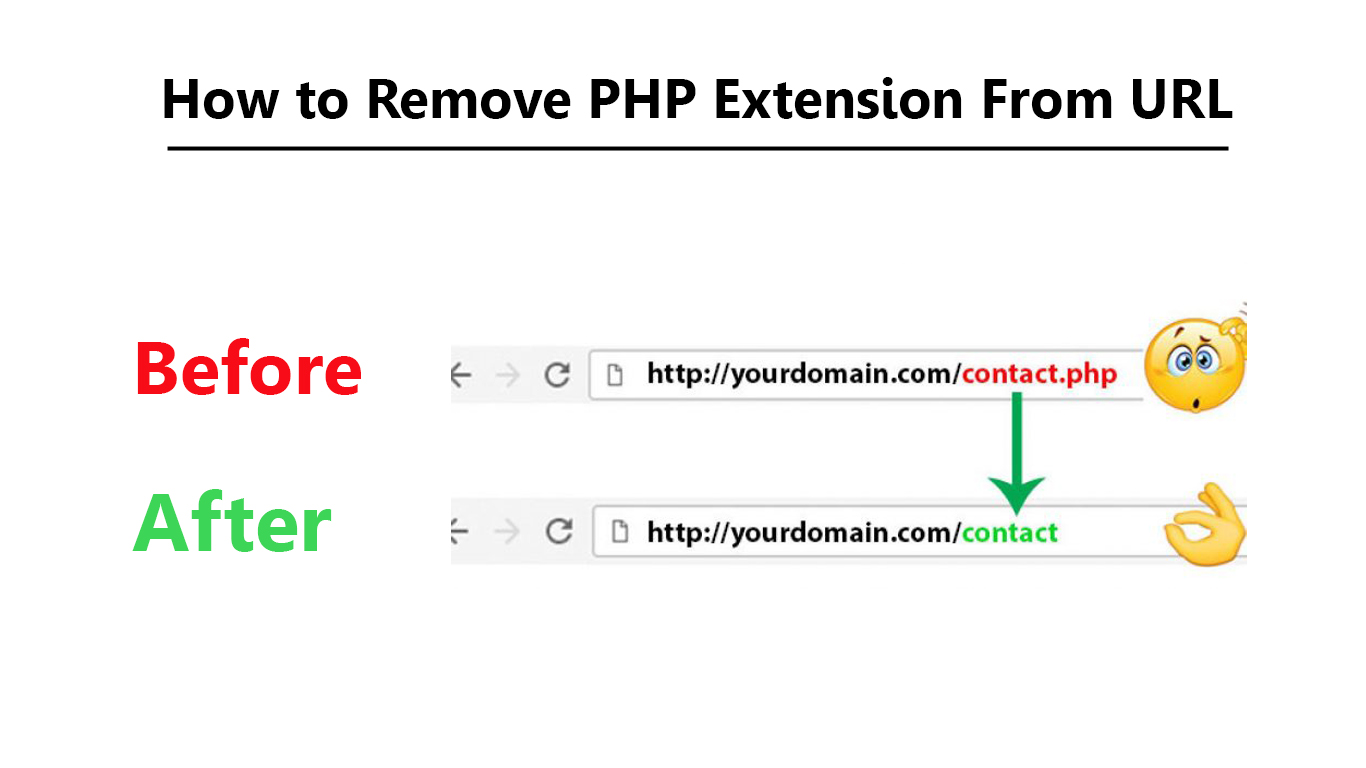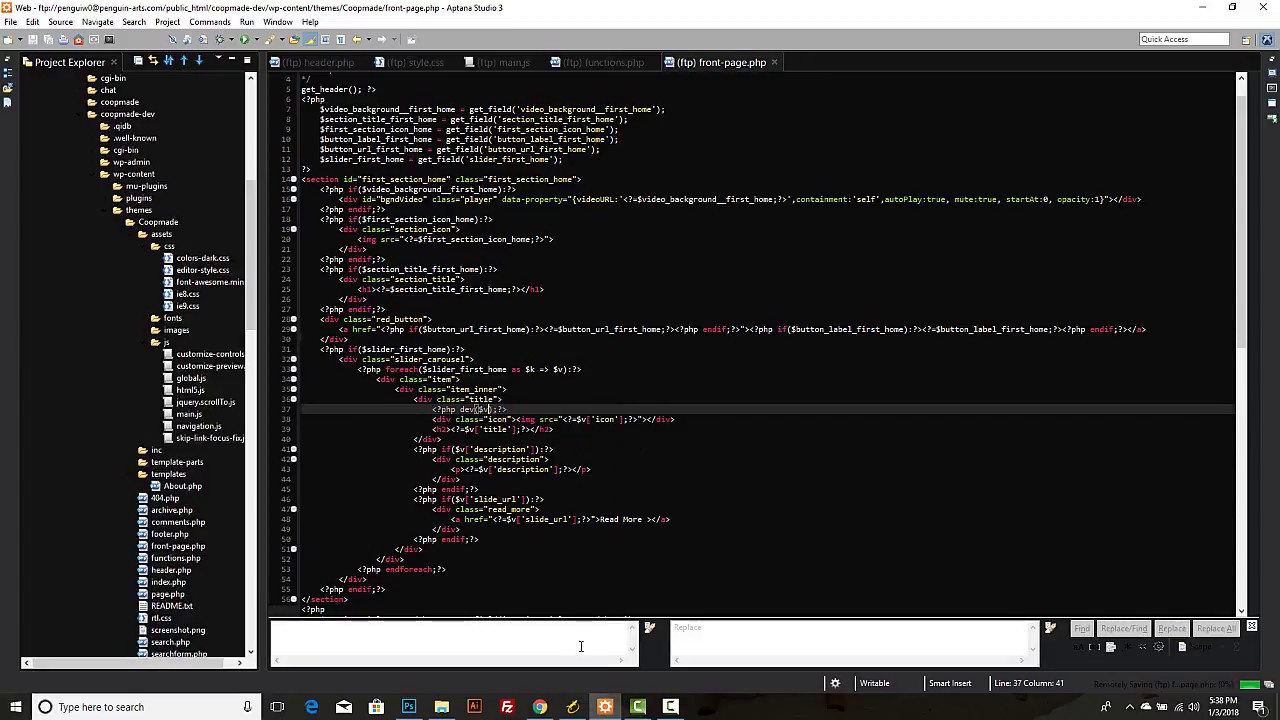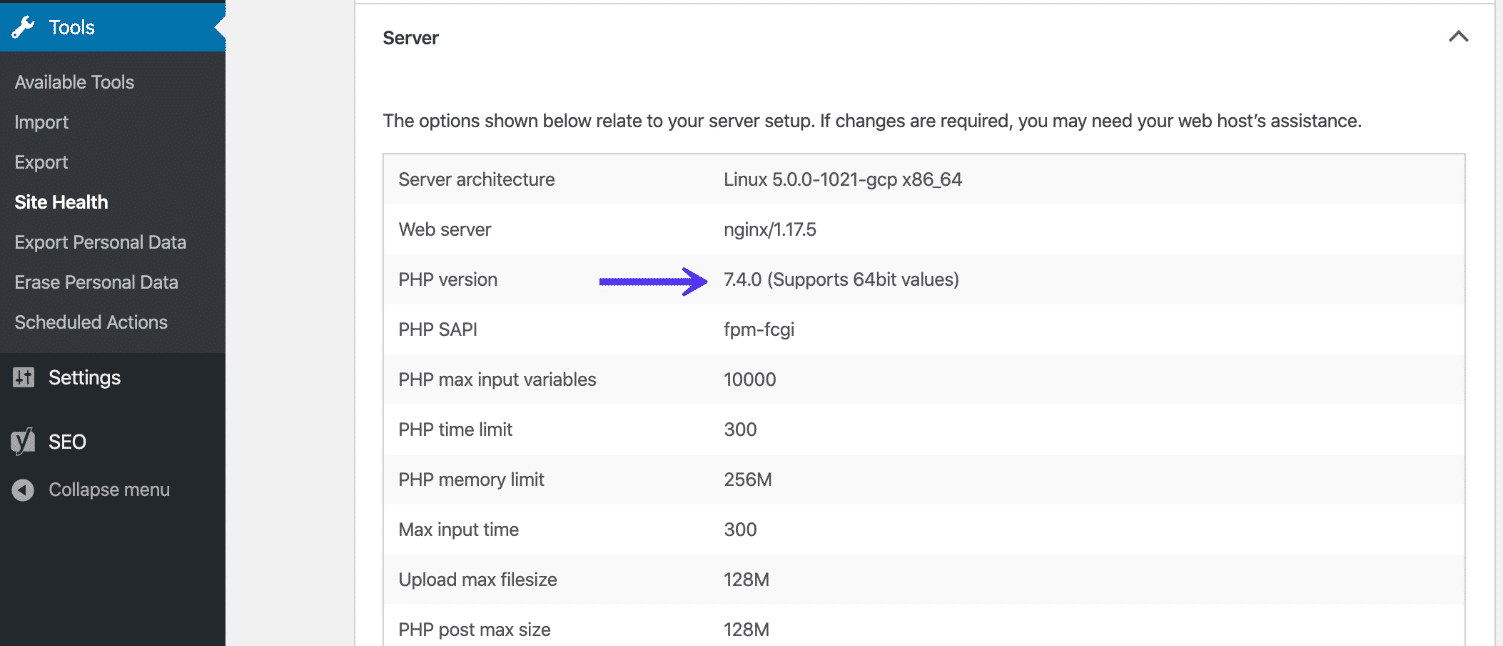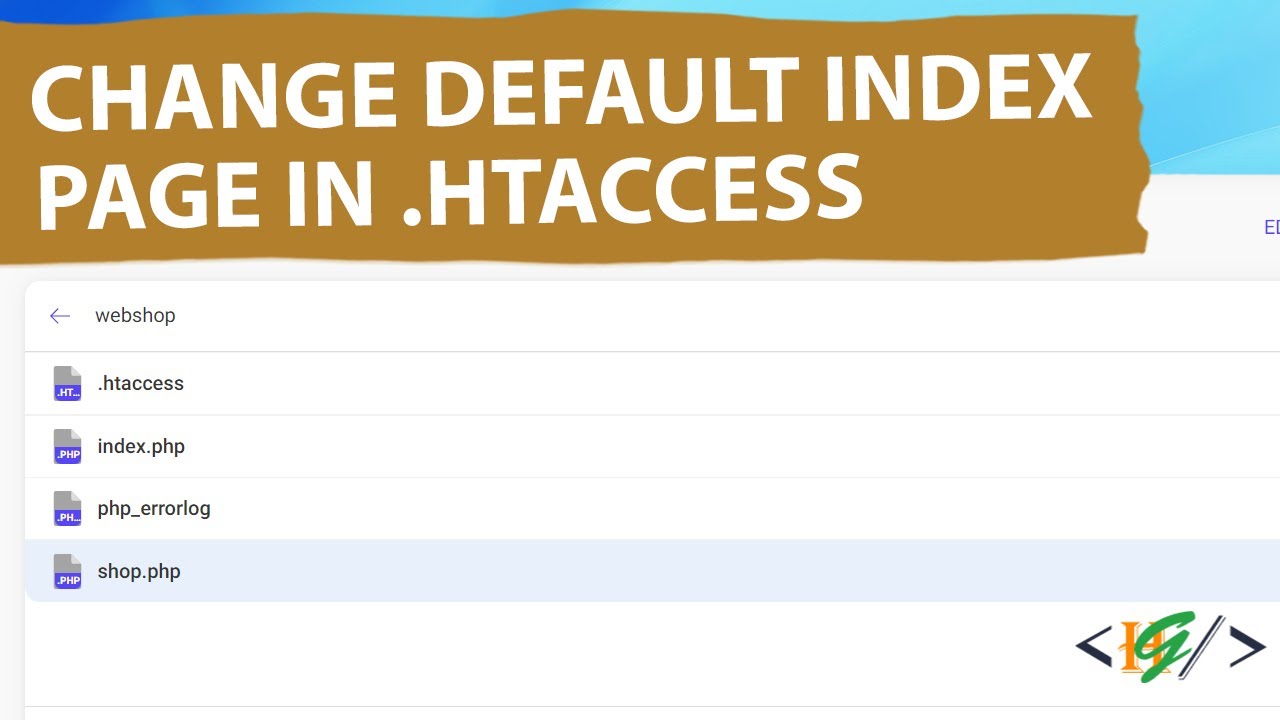Introduction
PHP, which stands for Hypertext Preprocessor, is a popular programming language used for the development of dynamic websites and web applications. Since its inception in 1994, PHP has gained widespread popularity and is now used by millions of developers worldwide. It is known for its versatility, ease of use, and extensive community support.
With its rich set of features and functionality, PHP has become the go-to choice for many web developers. In this article, we will explore the reasons why PHP is widely used and why it continues to be a popular choice in the web development community.
From its inception, PHP was designed to simplify web development by embedding server-side scripting into HTML. This unique approach allows developers to dynamically generate web pages and interact with databases, making PHP ideal for building interactive and data-driven websites.
Additionally, PHP is an open-source language, meaning it is freely available for anyone to use and modify. This open nature has led to a large and active community of developers who contribute to the language’s growth and improvement. The community actively develops libraries, frameworks, and content management systems (CMS) that make PHP development faster and more efficient.
Moreover, PHP’s ease of use sets it apart from other programming languages. The syntax is similar to C and Perl, making it accessible for developers who are already familiar with these languages. The learning curve is relatively gentle, enabling beginners to quickly grasp the fundamentals and start building applications.
Furthermore, PHP’s versatility and scalability make it suitable for projects of all sizes. Whether you are developing a simple personal blog or a complex enterprise-level application, PHP can handle it. It provides a wide range of functions and libraries, empowering developers to tackle a variety of tasks, such as handling forms, managing files, interacting with APIs, and much more.
One of the primary reasons for PHP’s popularity is its wide range of frameworks and CMSs. These frameworks, such as Laravel, Symfony, and CodeIgniter, provide developers with a solid foundation to build robust and efficient applications. CMSs like WordPress and Drupal leverage PHP’s power to allow easy content management and site customization.
Another advantage of PHP is its excellent compatibility and integration capabilities. It can run on various operating systems, including Windows, macOS, and Linux, and can seamlessly integrate with different databases, such as MySQL, PostgreSQL, and SQLite. This compatibility ensures that PHP can be used in diverse development environments.
PHP’s commitment to continuous improvement is evident through its regular updates and releases. The PHP community constantly introduces new features and enhancements, making PHP more efficient, secure, and reliable. This dedication to refinement ensures that PHP remains a relevant and cutting-edge programming language.
Easy to Learn and Use
One of the key factors that contribute to PHP’s popularity is its ease of learning and use. Unlike some other programming languages, PHP has a relatively gentle learning curve, making it accessible for beginners.
The syntax of PHP is derived from C and Perl, two widely used programming languages. If you are already familiar with these languages, you will find it easy to understand and write PHP code. Even for those new to programming, PHP provides a straightforward and intuitive syntax that is easy to grasp.
Furthermore, PHP offers extensive documentation and a plethora of online resources, making it easy for developers to find support and guidance. The official PHP documentation provides detailed explanations, examples, and reference materials, ensuring that developers have the necessary resources to learn and use PHP effectively.
In addition to its user-friendly syntax and abundant documentation, PHP offers a wide range of built-in functions and libraries. These pre-defined functions allow developers to easily handle common tasks such as form validation, file handling, database interactions, and much more. By leveraging these built-in functions, developers can save time and effort in coding, resulting in more efficient development.
Moreover, PHP integrates seamlessly with various web servers, including Apache, Nginx, and IIS. This compatibility ensures that PHP code can run smoothly on different server platforms, making it flexible and widely deployable. Additionally, PHP supports multiple platforms, including Windows, macOS, and Linux, further extending its reach and accessibility.
The ease of use extends beyond the language itself. PHP has a vast and active community of developers who contribute to its growth and improvement. This community-driven culture means that developers can readily find support, share knowledge, and collaborate on projects. The PHP community fosters an environment of continuous learning, making it easier for newcomers to embark on their PHP development journey.
Furthermore, developers can benefit from the numerous PHP frameworks and content management systems (CMS) available. These frameworks, such as Laravel, Symfony, and CodeIgniter, provide a structured and organized approach to PHP development. By following a framework’s conventions and best practices, developers can streamline their development process and build more robust and scalable applications.
To summarize, PHP’s ease of learning, user-friendly syntax, abundant documentation, built-in functions, and supportive community make it a breeze to use for developers of all skill levels. Whether you are a beginner or an experienced programmer, PHP offers a comfortable and intuitive environment for web development.
Large Developer Community
PHP boasts a large and vibrant developer community that plays a pivotal role in its continued success and widespread adoption. The size and active participation of this community are significant advantages for developers choosing to work with PHP.
Being an open-source language, PHP encourages collaboration and contributions from developers worldwide. The PHP community is known for its passion and dedication, constantly pushing the boundaries of what can be achieved with the language. This collective effort results in a wealth of resources, tutorials, forums, and online communities where developers can find support, share knowledge, and collaborate on projects.
The size of the PHP developer community is a testament to the language’s popularity and longevity. Millions of developers worldwide choose PHP for their web development projects, creating a vast network of expertise and experience. This community acts as a valuable resource for both beginners and seasoned developers, providing a wealth of knowledge and insights.
One of the benefits of such a large community is the availability of extensive documentation. PHP has comprehensive and well-maintained documentation, providing in-depth explanations, examples, and guides. The official PHP documentation serves as a go-to reference for developers, ensuring that they have access to reliable information and best practices.
Furthermore, the PHP community actively develops and maintains a wide range of libraries, frameworks, and tools. These resources make it easier for developers to build robust web applications efficiently. Popular PHP frameworks such as Laravel, Symfony, and CodeIgniter provide developers with a solid foundation and a set of conventions, allowing them to focus on building application-specific features rather than reinventing the wheel.
Online forums and discussion communities dedicated to PHP offer a platform for developers to seek help, share ideas, and discuss best practices. These platforms facilitate knowledge exchange, fostering a supportive environment where developers can learn from each other and collaborate on solving complex problems.
Another advantage of a large developer community is the availability of skilled PHP developers in the job market. Companies looking for PHP expertise can tap into this pool of talent to find experienced professionals who are well-versed in PHP development.
Moreover, the PHP community organizes conferences, meetups, and events where developers can connect, network, and stay updated on the latest trends and innovations in the PHP ecosystem. These gatherings provide opportunities for learning, mentoring, and building relationships with like-minded professionals.
In summary, the large and active PHP developer community serves as a valuable resource for developers. It offers extensive documentation, a wealth of libraries and frameworks, online forums for support and collaboration, and numerous networking opportunities. The PHP community’s collective knowledge and experience contribute to the growth and improvement of the language, making it an attractive choice for developers around the world.
Versatile and Scalable
PHP is widely recognized for its versatility and scalability, making it suitable for a wide range of web development projects, from small personal websites to large-scale enterprise applications.
One of the key reasons for PHP’s versatility is its extensive set of built-in functions and libraries. PHP provides a wide range of capabilities, including handling forms, processing files, interacting with databases, and performing various calculations. These built-in functions save developers time and effort by providing ready-to-use solutions for common web development tasks.
Additionally, PHP supports a vast number of frameworks and content management systems (CMS), further enhancing its versatility. Frameworks like Laravel, Symfony, and CodeIgniter offer a structured and organized approach to developing complex web applications. They provide a set of tools, conventions, and best practices that facilitate efficient and scalable application development.
Furthermore, the scalability of PHP allows applications to grow and handle increased traffic and data without sacrificing performance. PHP can easily handle heavy loads and can be scaled horizontally by adding more servers to distribute the workload. This scalability makes PHP a viable choice for high-traffic websites and applications that need to handle a large number of concurrent users.
PHP’s scalability is further supported by its ability to integrate with various caching systems, such as Memcached and Redis. Caching helps reduce the load on servers by temporarily storing frequently accessed data in memory, resulting in faster response times and improved scalability.
In addition to its scalability, PHP’s versatility is evident in its compatibility with different operating systems and database management systems. PHP can run on various platforms, including Windows, macOS, and Linux, allowing developers to choose the environment that best suits their needs. Furthermore, PHP seamlessly integrates with popular databases such as MySQL, PostgreSQL, and SQLite, offering flexibility when designing and managing database-driven applications.
Moreover, with the rise of cloud computing, PHP’s versatility shines through its compatibility with cloud platforms such as Amazon Web Services (AWS), Microsoft Azure, and Google Cloud. Developers can leverage the power and scalability of these platforms to deploy PHP applications globally, ensuring high availability and performance.
Overall, PHP’s versatility and scalability make it a suitable choice for a wide range of web development projects. Its extensive set of built-in functions, compatibility with frameworks and CMS, scalability features, and integration capabilities with various platforms and databases offer developers the flexibility to build robust and scalable applications that can adapt to changing requirements and growing user bases.
Wide Range of Frameworks and CMSs
PHP offers a wide variety of frameworks and content management systems (CMS) that enhance developers’ productivity and provide them with a solid foundation for building web applications efficiently.
Frameworks in PHP, such as Laravel, Symfony, and CodeIgniter, are incredibly popular among developers. These frameworks provide a structured and organized approach to PHP development, offering a set of pre-defined conventions, libraries, and tools that simplify and streamline the development process.
Laravel, known for its elegant syntax and expressive features, has gained significant popularity in recent years. It includes features such as a powerful ORM (Object-Relational Mapping) for database management, a robust routing system, built-in authentication, and support for unit testing. Laravel’s extensive documentation and active community make it an excellent choice for building scalable and maintainable applications.
Symfony, on the other hand, focuses on flexibility and interoperability. It provides a modular approach to development, allowing developers to choose the components they need and integrate them seamlessly. Symfony also offers a rich ecosystem of bundles and extensions, enabling developers to leverage existing solutions and accelerate their development process.
CodeIgniter is known for its simplicity and speed. It is a lightweight framework that prioritizes performance and efficiency. CodeIgniter’s small footprint makes it suitable for small to medium-sized projects where speed is crucial. It provides essential features and a straightforward structure that allows developers to build applications quickly and efficiently.
In addition to frameworks, PHP offers a wide range of content management systems that leverage PHP’s power for easy content management and website customization.
WordPress, the most popular CMS in the world, is built entirely on PHP. It provides a user-friendly interface, a vast library of plugins and themes, and a robust community. WordPress is an ideal choice for bloggers, small business owners, and content-focused websites due to its ease of use, extensibility, and large plugin ecosystem.
Drupal, another PHP-based CMS, is designed for complex and enterprise-level websites. It offers powerful content management capabilities, advanced user management, and scalability. Drupal’s modular architecture and extensive APIs make it a flexible and customizable solution for building large-scale websites.
Joomla is another PHP-based CMS known for its flexibility and ease of use. It offers a user-friendly admin interface, extensive extensions directory, and a strong community. Joomla caters to a wide range of websites, from small personal sites to complex corporate portals and e-commerce platforms.
These are just a few examples of the many frameworks and CMSs available in PHP. Despite their differences, all these tools share a common goal of making PHP development more efficient, structured, and customizable. Whether you need a framework for building complex applications or a CMS for managing content, PHP offers a diverse ecosystem of solutions to meet your specific requirements.
Server-Side Scripting
PHP is widely recognized for its powerful server-side scripting capabilities, which enable developers to create dynamic and interactive websites. Server-side scripting refers to the ability to execute code on the server before delivering the final HTML to the client’s browser.
With PHP, developers can embed the PHP code directly into HTML files, using special tags like to delineate the sections of code. This integration of code allows developers to generate dynamic content based on user input, database queries, or any other backend logic.
Server-side scripting has several advantages over client-side scripting languages such as JavaScript. Firstly, it enhances the security of the application by keeping sensitive code and data hidden from the user. Because the PHP code is executed on the server, users cannot access or modify the server-side code, making it more difficult for malicious attacks or unauthorized access.
Moreover, server-side scripting allows developers to interact with databases seamlessly. PHP provides extensive support for various database management systems like MySQL, PostgreSQL, and SQLite. With PHP’s database connectors and functions, developers can execute SQL queries, retrieve data, and manage database operations efficiently.
Another benefit of server-side scripting is the ability to handle form submissions and user input. PHP can process form data, validate input, and perform necessary actions based on user interactions. This allows developers to build interactive web applications that respond to user input in real-time, enhancing the overall user experience.
The use of server-side scripting also enables developers to maintain consistent layouts and designs across multiple pages. By separating HTML code from PHP code, developers can create reusable templates and include common elements such as headers, footers, and navigation menus. This modular approach simplifies maintenance and updates, as changes made to the template file are reflected across all pages that utilize the template.
Additionally, server-side scripting allows developers to implement authentication and access control features. By leveraging PHP’s built-in functions and libraries, developers can secure web applications by implementing user registration, login systems, and user roles and permissions. This ensures that only authorized users can access certain areas or perform specific actions within the application.
Server-side scripting is also essential for e-commerce applications, where secure payment processing and transaction handling are required. PHP provides secure protocols and libraries, such as SSL and encryption functions, for handling sensitive data and ensuring secure communications between the server and the user’s browser.
Overall, PHP’s server-side scripting capabilities enable developers to create dynamic, interactive, and secure web applications. By leveraging PHP’s integration with HTML, database connectivity, form handling, templating, and security features, developers have the tools to build robust and efficient server-side applications that meet the needs of modern web development.
Cost-Effective
PHP, being an open-source language, offers significant cost advantages for developers and businesses alike. Here are several reasons why PHP is considered a cost-effective choice for web development projects.
Firstly, the fact that PHP is open-source ensures that it is freely available for anyone to use, modify, and distribute. This eliminates the need for expensive licensing fees, making PHP an attractive option for businesses and individuals with budget constraints.
Moreover, the vast community of PHP developers actively contributes to the language’s growth and improvement. The community provides a wealth of free resources, such as documentation, tutorials, forums, and libraries. Access to these resources allows developers to troubleshoot issues, seek guidance, and learn from others’ experiences, which further reduces the cost of development.
Additionally, PHP’s integration with popular databases like MySQL, PostgreSQL, and SQLite offers cost-effective solutions for data storage and management. These databases are open-source, widely adopted, and well-supported, meaning developers can leverage robust database systems without incurring additional costs.
Furthermore, PHP’s compatibility with multiple operating systems, including Windows, macOS, and Linux, contributes to its cost-effectiveness. Developers can choose an operating system that aligns with their budget and infrastructure, without being locked into a specific platform that entails additional expenses.
PHP’s wide range of frameworks and content management systems (CMS) also play a role in its cost effectiveness. These frameworks and CMSs, such as Laravel, Symfony, WordPress, and Joomla, offer a plethora of pre-built functionalities and modules. By leveraging these pre-existing solutions, developers can significantly reduce development time and costs, accelerating the delivery of their projects.
Moreover, PHP’s performance efficiency translates into cost savings. PHP is known for its scalability and speed, allowing applications to handle high volumes of traffic without the need for expensive server setups. This scalability ensures that businesses can accommodate their growing user bases and scale their infrastructure as needed, all while keeping costs in check.
PHP’s compatibility with cloud platforms, such as Amazon Web Services (AWS), Microsoft Azure, and Google Cloud, is yet another cost-effective advantage. By leveraging the power of cloud computing, businesses can scale their PHP applications on-demand, paying only for the resources they consume. This scalability and flexible pricing models enable cost optimization, especially for projects with fluctuating user demands.
Lastly, PHP’s popularity and wide adoption mean that there is a large pool of skilled developers available at competitive rates. Businesses can tap into this talent pool, either by hiring in-house developers or outsourcing projects, without incurring exorbitant costs associated with niche languages or technologies.
In summary, PHP’s open-source nature, extensive community support, compatibility with various operating systems and databases, availability of frameworks and CMSs, performance efficiency, cloud compatibility, and access to affordable talent make it a cost-effective choice for web development projects of any scale.
Excellent Compatibility and Integration
PHP enjoys excellent compatibility with various technologies, platforms, and databases, making it a versatile and highly integratable programming language. This compatibility and integration capabilities have played a significant role in PHP’s widespread adoption in the web development community.
First and foremost, PHP can run on multiple operating systems, including Windows, macOS, Linux, and Unix. This cross-platform compatibility allows developers to choose the operating system that best suits their needs and infrastructure without being restricted to a specific platform.
Furthermore, PHP integrates seamlessly with different web servers, such as Apache, Nginx, and IIS. The PHP code can be easily deployed and executed on these servers, ensuring compatibility and providing a flexible environment for hosting PHP applications.
One of the key areas of PHP’s compatibility lies in its support for various databases. PHP offers built-in database extensions for popular database management systems like MySQL, PostgreSQL, SQLite, and more. This compatibility allows developers to connect to different database systems and perform database operations efficiently within their PHP applications.
In addition to traditional databases, PHP also supports NoSQL databases like MongoDB and Apache Cassandra. The flexibility to work with different database systems enables developers to choose the most suitable database solution based on their project requirements.
PHP’s compatibility extends beyond operating systems and databases. It can seamlessly integrate with other technologies and protocols commonly used in web development. For example, PHP supports protocols like HTTP, SMTP, FTP, and more, allowing developers to perform various operations, such as sending emails, uploading files, and retrieving data from external sources.
Another notable integration capability is PHP’s compatibility with existing web services and APIs. PHP can easily consume and interact with APIs using frameworks like GuzzleHTTP, making it seamless to integrate with third-party services like payment gateways, social media platforms, and other online services.
Furthermore, PHP’s compatibility with front-end technologies is exceptional. PHP works seamlessly in conjunction with HTML, CSS, JavaScript, and other client-side languages and frameworks. This compatibility ensures smooth data exchange between the server-side PHP code and the client-side interface, enabling dynamic and interactive web applications.
Moreover, PHP easily integrates with popular content management systems (CMS) like WordPress, Joomla, Drupal, and more. These CMSs are built on PHP and provide powerful tools for managing content, creating websites, and customizing functionality. PHP’s compatibility with these CMSs enables developers to leverage the strengths of both platforms, resulting in highly flexible and feature-rich websites.
Overall, PHP’s excellent compatibility and integration capabilities allow developers to work seamlessly with various technologies, platforms, databases, web services, and CMSs. This flexibility empowers developers to build robust and efficient web applications that can interface with a wide range of systems and components, enhancing the overall functionality and user experience.
Continuous Improvement and Updates
PHP has a vibrant and dedicated community that places a strong emphasis on continuous improvement, leading to regular updates and enhancements to the language. This commitment to refinement ensures that PHP remains relevant, secure, and at the forefront of modern web development.
The PHP community actively contributes to the development and evolution of PHP, driving its continuous improvement. Thousands of developers collaborate through mailing lists, forums, and community-driven projects, providing feedback, reporting bugs, and suggesting new features. This collaborative effort ensures that PHP reflects the needs and interests of its users.
One of the notable strengths of PHP is its active development team. The PHP development team is dedicated to maintaining and advancing the language, monitoring bug reports, implementing fixes, and introducing new features. They release regular updates and patches to address vulnerabilities, improve performance, and add functionality, ensuring that PHP remains a robust and secure language.
PHP follows a standardized release process, adhering to the principles of semantic versioning. This approach ensures that updates are backward-compatible, minimizing the impact on existing codebases. It also provides predictable schedules for major releases, minor updates, and bug fixes, allowing developers to plan and adapt their projects accordingly.
With each new version, PHP introduces features and improvements that enhance the language and its capabilities. For example, PHP 7, released in 2015, brought significant performance improvements, making PHP applications faster and more efficient. Subsequent updates and releases have continued to refine and optimize PHP, resulting in even greater performance gains.
Security is a crucial aspect of modern web development, and PHP is committed to providing a secure programming environment. The PHP development team monitors and addresses security vulnerabilities promptly, releasing updates and patches to protect against potential threats. This proactive approach to security helps keep PHP applications resilient and protected from malicious attacks.
In addition to security and performance improvements, PHP also introduces new language features and functionality. These updates allow developers to leverage the latest programming paradigms and techniques, promoting more efficient and maintainable code. Through regular updates, PHP ensures that developers have access to the tools and capabilities necessary to build modern, cutting-edge applications.
Furthermore, PHP’s continuous improvement extends beyond the core language. The PHP community actively develops and maintains a vast ecosystem of libraries, frameworks, and tools that further enhance PHP’s capabilities. These resources address specific domains and use cases, providing developers with specialized functionalities and ready-made solutions for common development challenges.
As web technologies and development practices evolve, PHP remains adaptable and responsive to industry trends. By listening to user feedback, embracing emerging standards, and adopting best practices, PHP continues to evolve and stay relevant in a fast-paced and ever-changing web development landscape.
In summary, PHP’s continuous improvement and regular updates ensure that the language remains relevant, secure, and high-performing. The active participation of the PHP community, the dedication of the development team, and the adherence to industry standards contribute to PHP’s ongoing evolution, making it a reliable and future-proof choice for web development projects.
Conclusion
PHP, with its ease of learning, extensive developer community, versatility, excellent compatibility, and continuous improvement, remains a popular choice for web developers worldwide. Its server-side scripting capabilities allow for dynamic and interactive web applications, while its wide range of frameworks and content management systems provide developers with the tools to build robust and efficient solutions.
PHP’s cost-effectiveness, open-source nature, and compatibility with various operating systems, databases, and technologies make it an ideal choice for projects of all sizes. The language’s continuous improvement and updates ensure it stays relevant and adaptive to evolving industry trends, ensuring developers have access to the latest features and security enhancements.
Furthermore, the large and active PHP developer community contributes to its growth and improvement, providing a wealth of resources, support, and collaboration opportunities. The vast ecosystem of libraries, frameworks, and tools further enhances PHP’s capabilities, empowering developers to build innovative and efficient applications.
In conclusion, PHP’s strength lies in its ability to combine simplicity and flexibility with powerful functionality, making it an accessible and versatile language for web development. Its vast adoption and continuous development ensure that PHP will continue to be a reliable and valuable choice for developers in the ever-evolving world of web development.

























